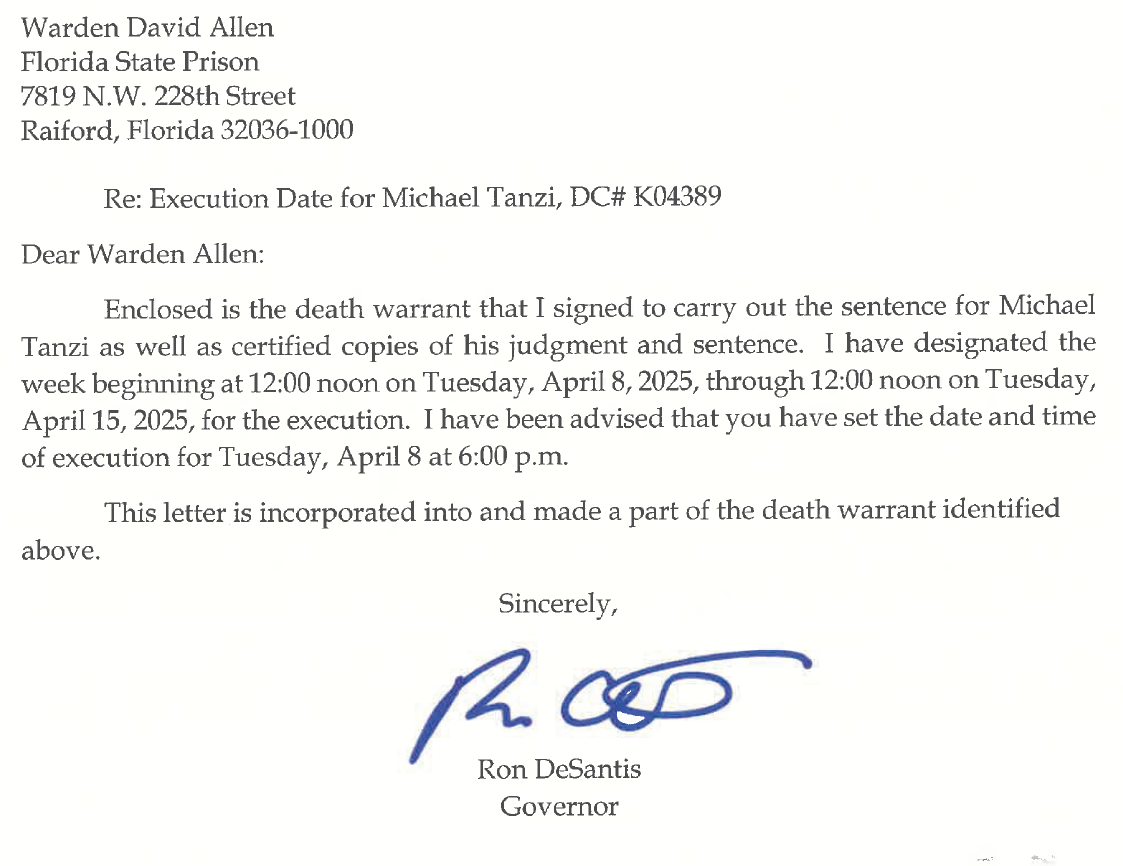BREAKING: Warrant signed for Michael Tanzi
This afternoon, Gov. DeSantis signed a death warrant scheduling the execution of Michael Tanzi for April 8, 2025, at 6:00 p.m.
This afternoon, Gov. DeSantis signed a death warrant scheduling the execution of Michael Tanzi for April 8, 2025, at 6:00 p.m.
The full warrant package is available on the Florida Supreme Court docket here.
The last time that more than one person was on death watch was in April 2023 when the Governor signed a death warrant for Darryl Barwick’s execution while Louis Gaskin remained on death warrant awaiting his execution. Before that, the last time was 2015—as I discussed here about Barwick’s case.
Shortest Warrant Period
The warrant provides a warrant period of 28 days—the shortest since DeSantis has been in office. Below are the warrant periods for the executions since DeSantis has been in office:
Robert J. Long: 29 days
Gary R. Bowles: 71 days
Donald Dillbeck: 31 days
Louis Gaskin: 30 days
Darryl Barwick: 30 days
Duane Owen: 37 days
James Barnes: 42 days
Michael Zack: 47 days
Loran Cole: 31 days
James Ford: 34 days
Edward James: 30 days
Scheduling Order
As it generally does, the Florida Supreme Court issued a Scheduling Order related to warrant-related litigation.
The Scheduling Order sets forth the following schedule:
Wednesday, March 19, at 3:00 p.m.: Trial court proceedings must be completed
Thursday, March 20 at 11:00 a.m.: Notice of Appeal and any habeas petition due to Florida Supreme Court
Note this is the day of Edward James’ scheduled execution.
Thursday, March 20 at 3:00 p.m.: Record on appeal due
Monday, March 24 at 11:00 p.m.: Initial Brief due
Wednesday, March 26 at 11:00 a.m.: Answer Brief due
Friday, March 28, at 11:00 a.m.: Reply Brief due
A copy of the Scheduling Order can be accessed on the Florida Supreme Court docket here.
Background of Tanzi’s Case
Trial & Direct Appeal
Michael Tanzi was indicted in Monroe County for the first-degree murder of Janet Acosta and other crimes based on the following facts:
During her lunch hour on April 25, 2000, Janet Acosta was reading a book while seated inside her maroon van parked at the Japanese Gardens in Miami. At that time, Tanzi was stranded in Miami without a means of returning to Key West, where he had been residing for the previous months. Tanzi saw Acosta sitting in her vehicle with her window rolled down and approached her, asking for a cigarette and the time. When Acosta was distracted, Tanzi punched her in the face until he gained entry to the van. He then threatened her with a razor blade and drove away with Acosta in the van. Tanzi held Acosta by the wrist until he reached Homestead.
Upon reaching Homestead, Tanzi stopped at a gas station, where he bound Acosta with rope that was in her van and gagged her with a towel. Tanzi further threatened Acosta, telling her that if she kicked or made noise he would cut her from ear to ear. Tanzi took Acosta's fifty-three dollars in cash. He then bought some cigarettes and a soda and attempted to use Acosta's bank card, which he had obtained after rifling through her belongings. While still in Homestead, Tanzi also forced Acosta to perform oral sex, threatening to kill her with his razor if she injured him. However, he stopped her from continuing because Acosta's teeth were loose as a result of the earlier beating.
Tanzi then continued to drive with Acosta bound and gagged in the rear of the van until he reached Tavernier in the Florida Keys, where he stopped at approximately 5:15 p.m. to withdraw money from Acosta's bank account. He again threatened Acosta with the razor in order to obtain Acosta's personal identification number. Tanzi thereafter stopped at a hardware store to purchase duct tape and razor blades.
Tanzi continued his journey until approximately 6:30 p.m. when he reached Sugarloaf Key. He decided that he needed to get rid of Acosta as she was getting in the way. He also knew he would get caught quickly if he released her alive. Tanzi proceeded to Blimp Road, an isolated area in Cudjoe Key. Tanzi told Acosta that he was going to kill her and then crosslaced a piece of rope and began to strangle her. He temporarily stopped to place duct tape over her mouth, nose, and eyes in an attempt to stifle the noise. Tanzi then continued to strangle Acosta until she died. Tanzi disposed of Acosta's body in a wooded, secluded area where he thought she would go unnoticed.
After the murder, Tanzi drove to Key West, where he shopped, ate, smoked marijuana, visited with friends, and used Acosta's ATM card. Tanzi had planned to access more of Acosta's money, sleep in a hotel, purchase drugs, and alter the van's appearance. However, on April 27, 2000, Tanzi's activities were interrupted when the police observed him returning to Acosta's van, which the police had located and placed under surveillance after Acosta's friends and coworkers reported her missing. When the police approached Tanzi, he had receipts in his pocket showing his ATM withdrawals and purchases. Tanzi stated that he “knew what this was about.” He also spontaneously stated he wanted to talk about some bad things he had done.
After waiving his rights and while in a police car en route to the Key West Police Department, Tanzi confessed that he had assaulted, abducted, robbed, sexually battered, and killed Janet Acosta. Tanzi repeated his confession with greater detail several times on audio and video tape. Tanzi also showed the police where he had disposed of Janet Acosta's body and where he had discarded the duct tape and rope.1
Tanzi pled guilty to first-degree murder, and the case proceeded to a penalty phase. During the penalty phase, Tanzi presented two mental health experts, “a forensics social worker specializing in sexual behavior problems, and a counselor at a homeless shelter, who testified about Tanzi's long history of mental problems and his stays in and diagnoses at various institutions.”
The social worker disclosed that Tanzi, when eight years old, was fondled by a thirteen-year-old boy and that the older boy later penetrated Tanzi anally. The sexual abuse continued for five years, ending only when the perpetrator turned eighteen and enlisted in the military. The social worker also explained that Tanzi acted out sexually in his youth following the abuse.
Dr. Vicary, a psychiatrist, testified that Tanzi suffered from bipolar disorder, substance abuse, paraphilia, and antisocial personality disorder. Dr. Raphael, a psychologist, testified that Tanzi suffered from polysubstance dependence, PTSD, exhibitionism, sexual sadism, voyeurism, ADHD, a learning disability, bereavement, and antisocial personality disorder. Dr. Raphael also stated that his firm suspected one of (and could not rule out) schizophrenia, schizoaffective disorder, or psychotic disorder.
Additionally, Tanzi's mother testified that she thought that Tanzi was a normal three year old but that he was having trouble getting along with other children by six years old. She also testified that Tanzi's father abused him verbally and physically after Tanzi's father was diagnosed with pancreatic cancer. She noticed changes in Tanzi's behavior when he was eight years old following his father's illness and death and following sexual abuse at the hands of an older boy. She sought treatment for Tanzi at various institutions throughout Tanzi's childhood.2
On February 19, 2003, the jury unanimously recommended that Tanzi be sentenced to death. The trial court followed the recommendation and sentenced Tanzi to death.
On May 9, 2003, Tanzi filed a motion seeking to withdraw his plea. The trial court denied his request.
On direct appeal in 2007, the Florida Supreme Court affirmed Tanzi’s first-degree murder conviction and death sentence. His sentence became final in February 2008.
Initial Postconviction & State Habeas
In February 2009, Tanzi filed a motion for postconviction relief. The postconviction court denied relief on all claims. Tanzi appealed the ruling and filed a petition for a writ of habeas corpus. In the habeas petition, Tanzi argued “tthat his appellate counsel was ineffective on direct appeal for failing to raise a claim regarding misstatements of law during voir dire and for failing to raise a Crawford claim.”3
In April 2012, the Florida Supreme Court affirmed the denial of Tanzi’s motion for postconviction relief. and denied his habeas petition.
Federal Habeas
Tanzi “filed a federal petition for writ of habeas corpus raising a number of claims,” which the federal district court denied. However, he was granted a certificate of appealability on two issues:
(1) “[w]hether Tanzi is entitled to federal habeas relief on his claim that he was denied effective assistance of counsel during the penalty phase of his capital trial”; and (2) “whether the late revelation that Tanzi might have a genetic abnormality constituted a Brady violation.” (footnote added). Both claims were adjudicated on the merits by the Florida Supreme Court.4
Tanzi’s claims of ineffective assistance of counsel focused on four errors: “(1) fail[ure] to present consistent mental health testimony; (2) fail[ure] to investigate and present Tanzi's XYY abnormality; (3) present[ation] [of] Dr. Vicary's testimony; and (4) fail[ure] to present additional mitigation witnesses.”5
In his Brady claim, Tanzi argued that “the State of Florida violated Brady because it failed to timely disclose that he might have an XYY genetic abnormality.”6 This information was disclosed to defense counsel “three days prior to the penalty phase.”
On November 19, 2014, the U.S. Court of Appeals for the Eleventh Circuit issued a decision denying relief on both claims.
Successive Postconviction
Tanzi sought relief after the U.S. Supreme Court’s 2016 decision in Hurst v. Florida.7 On April 5, 2018, the Florida Supreme Court affirmed the circuit court’s denial of Tanzi’s claim based on the jury’s unanimous recommendation for death.8 Justice Quince dissented.
My thoughts are with everyone involved in the warrant- and execution-related process.
Tanzi v. State, 964 So. 2d 106, 111 (Fla. 2007).
Tanzi v. State, 94 So. 3d 482, 487-88 (Fla. 2012).
Id. at 496.
Tanzi v. Sec’y, Fla. Dep’t of Corrs., 772 F.3d 644, 647 (11th Cir. 2014).
Id. at 652 (citation omitted).
Id. at 661.
Tanzi v. State, 251 So. 3d 805 (Fla. 2018).



